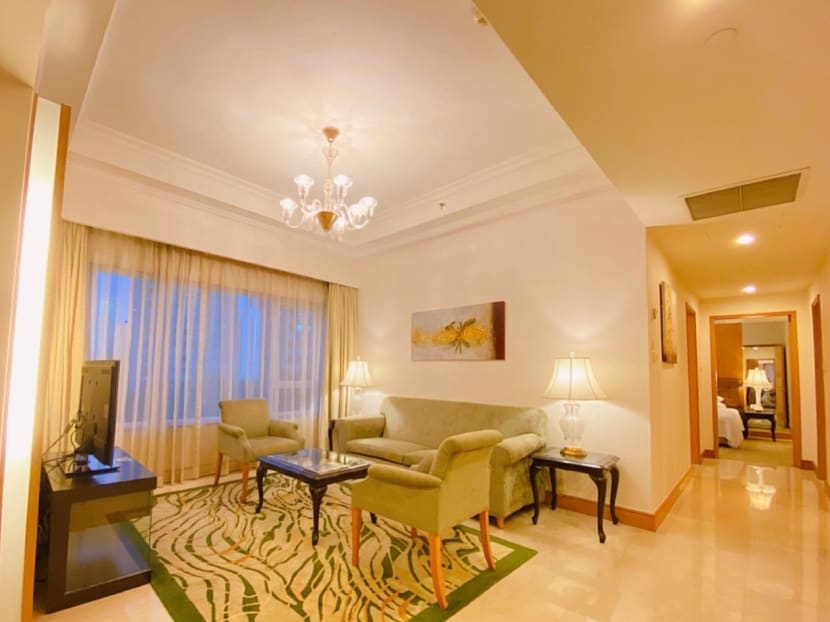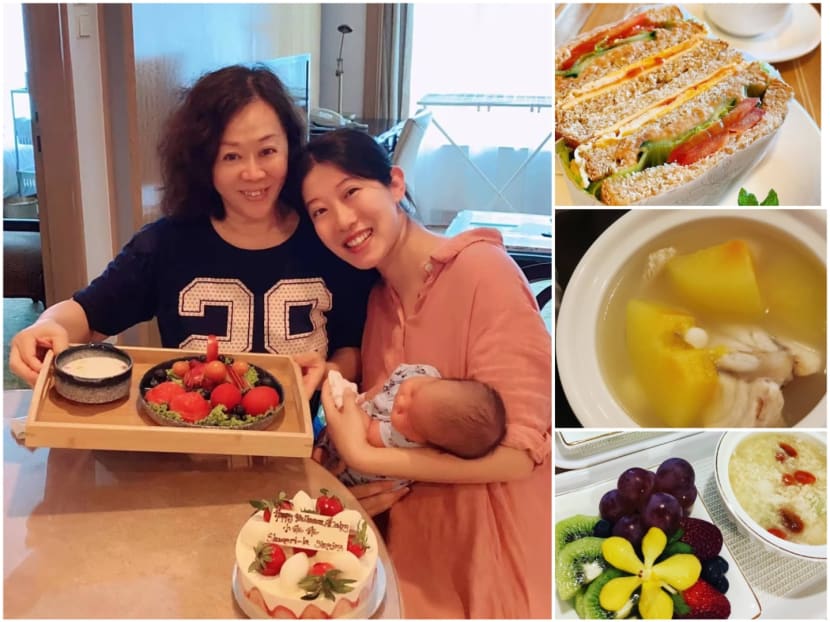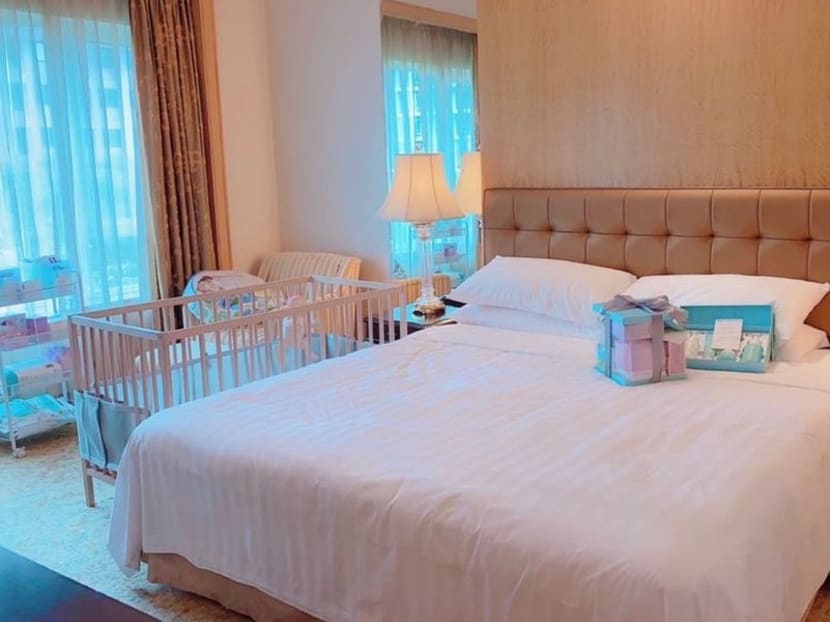- Joined
- Apr 14, 2011
- Messages
- 20,503
- Points
- 113
'Not easy' to pay S$23,800 for premium confinement care but Singaporean parents say it was 'worth it'

A view of a suite at Shangri-La Apartments, where women book to stay and recuperate during their confinement period after giving birth.
Follow us on Instagram and Tiktok, and join our Telegram channel for the latest updates.
- More new parents are splurging on premium postnatal care for the mothers in confinement
- It can cost them a five-figure sum if they check into confinement centre care, for instance
- A Singaporean couple who spent more than S$20,000 for such a stay shared their experience
- Doctors gave advice on what new mothers really need after giving birth
EVELINE GAN
Published August 19, 2023Updated August 19, 2023
WhatsAppTelegramFacebookTwitterEmailLinkedIn
SINGAPORE — Ms Chen Liyi, who gave birth to a baby boy in May, is among parents here who paid a five-figure sum for her confinement.
Instead of heading home after being discharged from the hospital, the 30-year-old project executive checked herself and her baby into a luxurious two-bedroom suite in Shangri-La Apartments on Anderson Road.
For the next 28 days, a dedicated team of postpartum experts put together by Singjoy — a confinement centre service provider— cared for her during her stay.
She and her husband, both Singaporeans, paid around S$23,800 for the stay and said that they have no regrets doing so.
“(At a confinement centre), you don’t need to worry about a lot of things. As first-time parents, my husband and I do not know much about looking after a newborn,” Ms Chen said, adding that paying a premium price for high quality postpartum care is now “the norm” among her family and friends.
READ ALSO
Boosting breast milk supply: 2 Singaporean men go for nuts and more to sell lactation-aid food
The cultural custom of women going into confinement after birth is to recuperate and adapt to caring for a newborn, but as Ms Chen has shown, it is no longer just a mere home-based practice with the resources you have in your own household.
In Singapore, it has turned into serious business, with more people now willing to splurge on premium postpartum services to ease themselves into parenthood, meaning it has become a lucrative affair for service providers.
Some doctors have observed a similar trend as well.
Dr Christopher Chong, a uro-gynaecologist and obstetrician and gynaecologist at Gleneagles Hospital, said: “In the old days, (postpartum) confinement basically means staying at home and eating confinement food, often prepared by a senior (member of the family) or a confinement nanny.
“But in the last 10 years, I’ve been hearing about patients who go for stays at confinement centres, spend on special wraps and Jamu massages (a traditional massage for women who have given birth), and go for weight loss programmes.
One of my patients said that she paid more than S$10,000 for such a programme.”
WHAT CONFINEMENT CENTRES OFFER NEW MUMS
READ ALSO
5-minute walks best way to comfort crying babies, says study
There are now at least 15 postpartum confinement centres in Singapore, when there was none about 10 to 15 years ago, Dr Chong noted.
Singjoy started offering confinement centre services at Shangri-La Apartments in 2018.
Singjoy’s founder, Ms Joey Zhang, said that the occupancy rate there is “always full”.
Its centre at Shangri-La Apartments caters to around 15 mothers each month, with five rooms on standby for last-minute requests and mothers who deliver earlier than expected, she added.
To cope with increasing demand, it recently opened a new branch along Havelock Road, offering one-bedroom options. A 28-day stay in a one-bedroom suite there is priced at around S$19,800, excluding tax.
“When we first started at Shangri-La, most of our clients were high-income families. But in recent years, we notice that there are more middle-income clients as well, which is why we opened our Havelock branch,” Ms Zhang said.
ADVERTISEMENT


READ ALSO
Breastfeeding issues shouldn’t get this complicated
Most confinement centres here charge a five-figure sum for a month-long stay.
Mothers staying in these centres are given personalised attention by a team specialising in confinement care, while the babies are cared for round-the-clock by either nurses or confinement nannies.
During her confinement centre stay with Singjoy, Ms Chen was fed nutritious meals, afternoon snacks and herbal tea specially prepared by an in-house chef daily.
A personal confinement nanny attended to her and her baby all day and night, and when the nanny rested, Ms Chen’s husband helped to mind the infant.
Licensed nurses and an in-house team of lactation consultants led by a International Board-Certified Lactation Consultant were also on hand to support Ms Chen’s needs and address any breastfeeding issues she may have.
A International Board-Certified Lactation Consultant is certified by the International Board of Lactation Consultant Examiners. It is the highest-level credential for healthcare professionals specialising in the management of breastfeeding.
READ ALSO
SME Diaries: Co-founding a startup amid Covid-19 was a leap of faith, but I wanted to help other breastfeeding mums
Ms Chen also enjoyed pampering services such as a daily herbal bath, foot spa, hair wash, head and shoulder massages and postnatal massages.
Mothers at the centre may attend postnatal yoga sessions, handicraft workshops and undergo therapy for wound care.
Ms Zhang said that the centre works with a panel of doctors from Speedoc, which offers home medical services, and has experts on hand to provide mental health support.
Ms Chen said: “When (my postpartum confinement ended), I felt like I was not ready to go home because I felt so comfortable there.”
Mr Joel Tan, 32, co-founder of confinement nanny service provider Nannymoon, said that even the older generation are now willing to invest to ensure that their adult children get the best quality service during the postpartum recovery period.
He has observed more grandparents-to-be enquiring about confinement packages, whose own children are expecting a baby. They make up about 10 to 20 per cent of the total enquiries that Nannymoon receives.
READ ALSO
Gen Y Speaks: I was a dropout and a teenage mum. Now I run a company that helps mothers
Mr Tan and his wife Chen Shiang Jing, 35, started their own confinement nanny business after having trouble hiring a confinement nanny during the Covid-19 pandemic. Their child was born in 2021.
To ensure that their clients are matched with a nanny that best suits their needs, Nannymoon uses a system that taps artificial intelligence in order to match the parties.
WHY PARENTS SPEND ON PREMIUM POSTNATAL SERVICES
Ms Chen Shiang Jing said that new parents are willing to spend more now because they want the best for themselves and their babies.“I think a possible reason could be that many new mothers today have busy and demanding lifestyles, and may not have the time or energy, or both, to devote to every aspect of infant care.
“So investing in quality service, like hiring a professional nanny, can provide them with the support and guidance that they need,” Ms Chen Shiang Jing said.
Hiring regular live-in nannies may cost a few thousand dollars a month, but some parents still end up spending a five-figure sum by the time they add up everything.
READ ALSO
#trending: Decluttering queen Marie Kondo's revelation that she has 'given up' on keeping tidy sparks off social media storm
For her own confinement after the birth of her child, Ms Chen Shiang Jing and Mr Tan hired a live-in nanny. After factoring in the costs of buying herbal tonics, confinement food, a good-quality breast pump, postnatal massages and other baby care items, Mr Tan estimated that they spent a five-figure sum.
Dr Chong pointed out that many new parents have less help at home now, compared to past generations where family sizes were bigger and there were more hands around the household to help.“
The confinement period is very important for mums. With our hormones raging in the postnatal period, I feel that spending some money to make ourselves feel better and relieve the stress is worth it, if you can afford it.
Ms Chen Liyi, who stayed at a confinement centre after giving birth
”
While cost was initially a concern, Ms Chen Liyi felt that her stay at Singjoy was “worth it”. It allowed her to focus on her recovery from her Caesarean section while learning the ropes of caring for a newborn.
She said that it was also more “practical” to do her postpartum confinement in a centre because their Build-to-Order government flat is not ready, and they did not have an extra bedroom for a live-in confinement nanny. The couple live with their parents and did not want to inconvenience them.
“The confinement period is very important for mums. With our hormones raging in the postnatal period, I feel that spending some money to make ourselves feel better and relieve the stress is worth it, if you can afford it,” she added.
“The older generation will say, ‘Why waste money’, and comment that during their time, they didn’t do all of these things (after childbirth). But I feel that if we are happy, it’s enough.
READ ALSO
Mum gnawed by guilt over ‘giving son poison’, after using Star Cream bought online for baby’s skin rash
“I’m glad that my husband feels this way, too.”
Ms Chen Liyi’s husband Jimmy Lin, a 34-year-old business owner, said that he wanted his wife and child to be well-supported and cared for during the confinement period.
“I felt guilty when my wife told me that everybody is going to focus on the baby. We tend to forget that the mothers are very important as well.
“If we do everything only for the baby, what about the mother, who is experiencing a new phase in life?” he asked.
“Honestly, it’s not easy to just spend S$20,000 like that, but I want my wife and child to have better care so that I don’t have to worry.
“So we decided to go ahead with it and not have a headache over it.”
WHAT DOCTORS SAY ABOUT POST-BIRTH RECOVERY
READ ALSO
Open verdict on death of 3-week-old baby who fell asleep in arms of dozing confinement nanny
From a maternal health point of view, Dr Chong said that it is important for mothers to get enough rest and support after giving birth, and not over-exert themselves.
Having nutritious meals is important as well.
“Most mothers will have a wound — either a C-section or episiotomy wound. Over-exerting and putting stress on the wound can cause poor healing, infection and tears, so it is good to have someone to cook and do the chores, and at times, take care of the baby so that the new mummy can rest.”
His view is that it is “not a bad idea” for mothers to pamper themselves after childbirth.
“Many may think they will not have so many babies, so why don’t they pamper themselves?” he added.
Although having extra pairs of hands to support new parents can be helpful during the postpartum period, getting too much help can backfire.
READ ALSO
Adulting 101: What I have learnt returning to work from maternity leave
Dr Mythili Pandi, a family physician with The Integrative Medical Centre, which provides maternal and baby health and lactation support, said: “We have been seeing more mothers who book a stay at the residential confinement centres for one to two months after childbirth.
“This means they are getting a lot of help in the first few weeks, which is great. But I think sometimes, the support is too much.”
Dr Mythili is also an International Board-Certified Lactation Consultant and the director of Mother and Child, a prenatal and postnatal hub for expectant couples and young families.“
I think if mothers regain their confidence in managing themselves and their baby early, it is much better for their mental health.
Dr Mythili Pandi, an International Board-Certified Lactation Consultant
”
For new mothers, good quality support should involve teaching them how to manage and care for their babies, she added.
Good quality lactation support is also crucial in the early post-delivery weeks.
“We have noticed that the breastfeeding rates at the confinement centres tend to be lower.
READ ALSO
Support from peers can help reduce risk of depression, anxiety in new mothers: NUS study
“It is not simply about whisking the baby away from the mother so that she has ‘sufficient rest’. When these mothers head back to their own homes, they may not know how to manage these responsibilities,” she said.
Dr Mythili wants to tell mothers who go for a no-frills postpartum confinement that they are “not at the losing end”.
“In fact, I think if mothers regain their confidence in managing themselves and their baby early, it is much better for their mental health.”
When considering postpartum services, such as a confinement centre stay or engaging a confinement nanny, Dr Chong advised parents-to-be to do their research early.
“Get genuine reviews from those who have tried the service. Get down to the centre to have a feel and speak with the people in charge.
“Interview the confinement nanny so you can understand each other and one another's expectations before committing,” he said.
READ ALSO
Adulting 101: The cost of raising children has always put me off having one. Is it really that expensive?
Dr Mythili said that it is also important for mothers to work out their breastfeeding goals and check if the centre provides support from the International Board-Certified Lactation Consultants.
And do not forget that fathers have a very crucial role to play as well, Dr Chong emphasised.
Fathers have to be “part of the team” to help the new mother feel loved and supported, he added.
“The most important thing is to be around and to be supportive. A simple hug and kiss can mean a lot to the one suffering most — the mother.
“Dad can help in many ways — simply taking over and letting the mother rest is a big help,” Dr Chong said.
